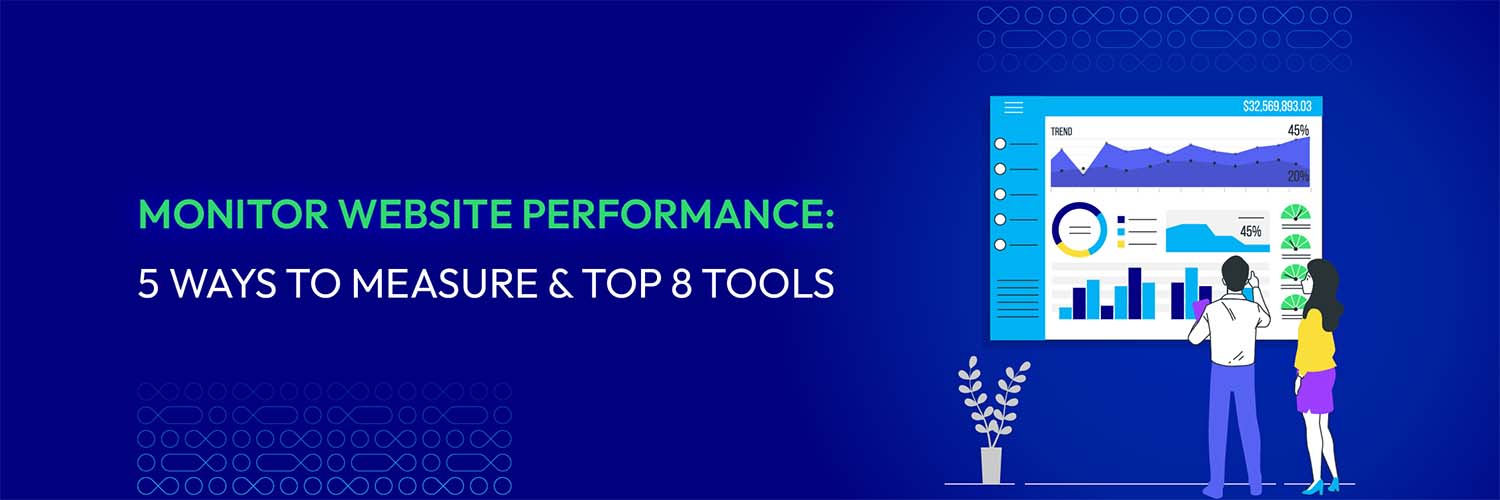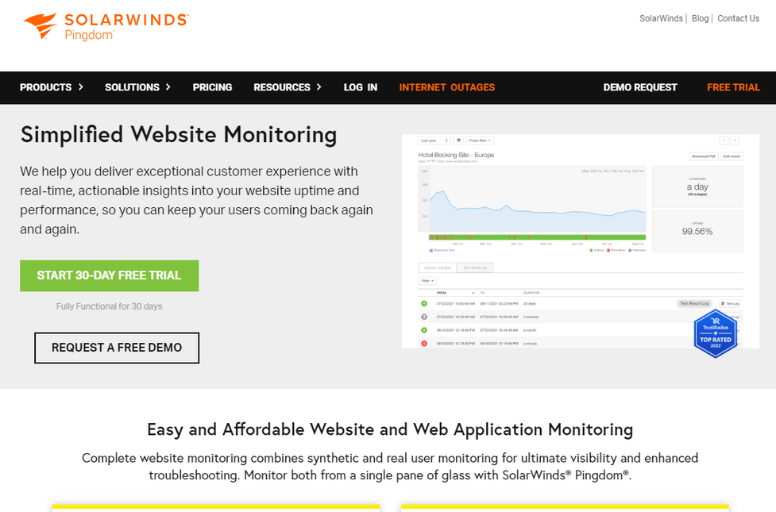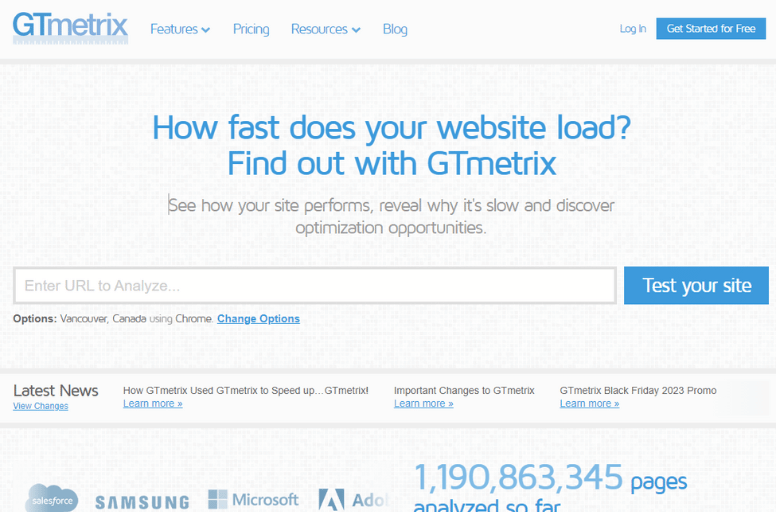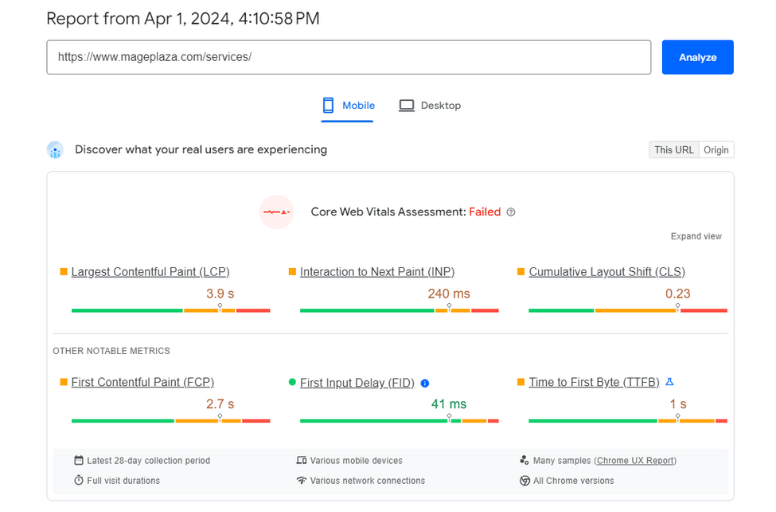8 Top-Notch Tools to Monitor Website Performance
Vinh Jacker | 07-18-2023

Do you wish your site to stand out from the crowd and deliver an exceptional user experience? Let’s monitor website performance proactively as soon as possible. By doing that, you can comprehensively evaluate various factors contributing to a website’s speed, responsiveness, and overall functionality.
This article will delve into the exciting realm of website performance monitoring. We will explore the top five ways to monitor website performance, equipping you with valuable insights and strategies to keep your site in top shape. Additionally, we will introduce you to eight effective tools that can enhance your monitoring efforts, providing you with actionable data and in-depth analytics to fine-tune your website’s performance.
What is website performance?

Website performance is the term used to describe the speed, responsiveness, and general effectiveness with which a website provides its users with material and functions. It includes various elements, such as page load times, server response times, and the ease of navigation and interactions, that affect the user experience.
To put it simply, website performance refers to how quickly and smoothly your website loads and runs for its users. A website with great performance loads rapidly, giving users a simple and easy surfing experience. On the other hand, a subpar website might irritate visitors, increase bounce rates, decrease engagement, and possibly lose out on commercial prospects.
Why should you monitor website performance?
It is essential to monitor website performance. First, it has an immediate impact on user pleasure. Users have limited patience for websites that take a long time to load; the majority of users will leave a website after a few seconds. A swift and responsive website makes it easy to obtain information and easily carry out desired tasks.
The second factor is how well a website performs in search results. In order to provide the greatest possible user experience, search engines like Google prioritize websites that are quick and well-optimized in their search results. Reduced organic traffic, worse ranks, and decreased exposure in search engine results pages (SERPs) can all be the effects of a slow website.
The effectiveness of a website can also affect conversion rates and overall business success. Websites that load quickly, have easy-to-use navigation, and offer a seamless browsing experience are more likely to captivate visitors and encourage them to make a purchase.
A website that performs well builds user trust, encourages prolonged visits, and raises the possibility that visitors will convert—make a purchase, complete a form, or sign up for a newsletter.
Say Goodbye to Slow Page Loading
Get Website Performance Audit. Speed it up - earn more sales & customer satisfaction.

Top 8 Tools to Monitor Website Performance
Here are eight tools to monitor website performance, both free and paid choices:
Free website performance monitoring tools
</p>
Google PageSpeed Insights evaluates your website’s performance on desktop and mobile platforms. It provides a score out of 100 and includes thorough advice on improving speed and user-friendliness.
The program assesses a number of factors, including image optimization, resource loading, caching, and server response times. Additionally, it offers information on how to make use of browser caching and options for code minification.
You can evaluate the functionality of your website with WebPageTest from various places all around the world. It offers detailed waterfall charts that illustrate the order in which resources are loaded and point out potential areas for improvement.
Performance ratings, measurements like time to first byte and completely loaded time, and recommendations for enhancing speed are all provided by WebPageTest. It offers advanced testing tools, allows you to test on numerous browsers, and lets you mimic varied connection speeds.
Paid website performance monitoring tools

Pingdom is a comprehensive tool uptime tracking and performance monitoring. It performs numerous global availability checks on your website and notifies you through email or SMS if there are any downtimes.
Pingdom offers thorough reports on response times, uptime, and performance rankings. Additionally, it provides real-user monitoring (RUM) capabilities for tracking user performance and experience across various gadgets and places.
An application performance monitoring (APM) solution called New Relic offers details about your website’s server architecture, databases, and apps. To find and fix performance problems, it provides real-time monitoring, analytics, and diagnostics.
Database queries, server response times, and application performance can all be seen in great detail with New Relic. It aids with performance optimization by locating bottlenecks, examining code-level performance, and offering useful advice.
Dynatrace is a tool for enterprise-level digital performance monitoring that provides complete transparency into the operation of your website. Root cause analysis, automatic anomaly detection, and real-time insights are all provided.
User experience, application performance, and infrastructure monitoring are just a few of the performance monitoring topics that Dynatrace addresses. It provides thorough analytics, scalable dashboards, and AI-powered performance insights.
Website performance monitoring, real-user monitoring, and application performance monitoring are all available through the comprehensive tracking and observability platform Sematext. It offers extensive metrics, such as resource utilization, response times, and error rates.
Sematext provides tools for proactive alerting, distributed tracing, and log management. You may connect performance data from many sources using the platform to thoroughly understand how well your website performs.
Free with paid website performance monitoring tools

A useful tool for monitoring website performance is GTmetrix. It provides in-depth analyses of waterfall diagrams, page load times, and other performance indicators. It offers advice for optimization along with scores based on the PageSpeed and YSlow techniques.
Server response times, caching, image optimization, and script minification are just a few of the variables that GTmetrix examines. Using the application, you can test using various places worldwide and simulate multiple connection speeds.
A well-liked uptime monitoring application called UptimeRobot periodically verifies that your website is accessible from various places. If your website is unavailable, it immediately notifies you via email, SMS, or connections. UptimeRobot also offers reaction time indicators for performance monitoring. Paid plans come with extra features like more frequent monitoring intervals, SSL monitoring, and more sophisticated alerting choices.
To monitor website performance, these tools provide a variety of features and capabilities. The decision between free and premium products is based on your individual requirements, financial constraints, and desired level of functionality and support.
Best Practices to Measure Website Performance: 5 best ways

It’s essential to monitor website performance to find areas for enhancement and guarantee the best customer experience. Here are the top five techniques to gauge the effectiveness of websites:
Check the speed of your page
A crucial component of website performance is page speed. Pages that load slowly may result in higher bounce rates and lower user engagement. As researched by Google researched by Google, when the time it takes for a webpage to load increases from 1 to 3 seconds, the bounce rate also increases by 32 percent.
The loading speed of your website is thoroughly reported by programs like Google PageSpeed Insights and GTmetrix, along with recommendations for improvement.
They look at image optimization, code minification, browser caching, and server response times. You may improve user experience and speed up your website by heeding their suggestions.
Pay attention to your bounce rate
Bounce rate indicates the percentage of visitors who leave your site after viewing only one page. A high bounce rate can signal various issues, such as irrelevant content, confusing navigation, slow loading times, or poor user experience.
Regularly tracking bounce rates using a reliable analytics tool is crucial. For Magento store owners, using specialized analytics tools like Magento 2 Google Analytics can help you pinpoint problematic pages and understand visitor behaviors clearly. With insights from detailed bounce rate reports, you can take effective actions—like improving content relevancy, enhancing page design, and optimizing navigation—to increase visitor engagement and reduce bounce rates.
Keep an eye on database performance
Websites that use databases to store and retrieve data must keep an eye on the performance of those databases. Slow database queries can substantially impact the responsiveness and speed of a website. Database performance insights are provided by tools like New Relic and MySQL Performance Schema, which show query execution times, resource usage, and slow query logs.
You may boost database performance and cut down on the time it takes to get data by optimizing database indexes, enhancing query effectiveness, and ensuring the server configurations are correct.
Calculate your first-byte time
First Byte Time (FBT) is a metric used to gauge how quickly a server responds to a request. A lengthy FBT may signal server or network problems that slow down websites. You may assess the FBT of your website using programs like WebPagetest and Pingdom.
They thoroughly explain all the steps to serve a web page, including DNS lookup, connection time, and server response time. By looking at these measurements, you may spot bottlenecks and do the appropriate server tuning, caching, or content delivery network (CDN) implementation tasks to lower FBT and speed up overall response times.
Monitor your uptime
Website uptime is the period of time during which users may access and use your website without any hiccups. Monitoring uptime is crucial to provide a flawless user experience and reduce potential revenue loss due to downtime. Uptime monitoring tools like UptimeRobot and Pingdom routinely verify your website’s accessibility and alert you if it becomes unavailable.
They offer performance reviews, real-time status updates, and response times measurements. You can quickly handle hosting or server-related problems, carry out maintenance procedures, and ensure your website is as accessible as possible for your users by keeping an eye on uptime.
Using these techniques to monitor website performance, you can learn a lot about the factors affecting your site’s speed, user interaction, database effectiveness, server response times, and general availability. You may use this knowledge to make wise choices to improve user experience, optimize your website, and help you accomplish your online goals.
Improve Website Performance with Mageplaze Service
If you are busy and need help, then utilize expert services for performance improvement to elevate your website. The Mageplaza team of professionals will examine your website, find areas that need work, and implement measures to increase speed, responsiveness, and user experience.
Here are reasons why you should choose our service:
-
Proactive in detecting issues and looking for solutions to reduce risks and improve the situation.
-
Both maintain the project’s quality, time, and budget while promptly adapting to changing circumstances.
-
Your rankings, conversion rates, and customer happiness will all see calculated improvements.
-
Improve the website’s responsiveness across all platforms, including tablets, desktops, and smartphones.
Don’t let your website’s bad performance and lengthy load times hinder it. Our performance optimization solution ensures that your website offers a flawless browsing experience, engages users, and promotes conversions.
BOOST YOUR WEBSITE PERFORMANCE NOW
Conclusion
In short, it is important to monitor website performance now to maximize the effectiveness of your online presence. Make it a key component of your digital strategy. Start monitoring and optimizing today, and enjoy the benefits of a high-performing website that leaves a lasting impression on your users.






